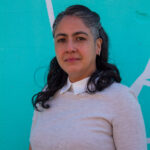Historical Sociology; Feminist Theory; Intersections of coloniality, empire, race, nation, gender and sexuality.
Read More About Dr. Patil
Vrushali Patil is Professor and Chair of the Department of Gender, Women’s, + Sexuality Studies. She received a Graduate Certificate in Women’s Studies (2004) and a PhD in Sociology (2006) from the University of Maryland, College Park.
As a historical sociologist and feminist theorist, Dr. Patil dives into how interrelated histories reshape our understanding of sex, gender, and sexuality in her 2022 book, Webbed Connectivities: The Imperial Sociology of Sex, Gender, and Sexuality. Her earlier work, Negotiating Decolonization in the United Nations: Politics of Space, Identity and International Community (Routledge) uses intersectional and transnational feminist perspectives to explore how masculinity has influenced global discussions on decolonization in the United Nations after World War II.
Dr. Patil’s research has been featured in journals like Signs, Gender & Society, Journal of Historical Sociology, Sex Roles, Annals of Tourism Research, among others. In these articles, she explores themes of intersectionality, coloniality, and transnational feminist perspectives. At UMBC, Dr. Patil brings these themes to life in her classes on Theories of Feminism, as she inspires students to think critically about global and historical power dynamics.
Transnational Feminist Science Studies, and the population/reproductive politics.
Read More About Dr. McCann
Dr. Carole McCann is Professor of Gender, Women’s, + Sexuality Studies. She received her Ph.D. in the History of Consciousness from the University of California, Santa Cruz. She has shaped the department’s growth since it was just a program. Dr. McCann has led the department as its Chair and served as Special Assistant to the Provost for Interdisciplinary Activities, guiding collaborative projects across disciplines. She also co-directs the UMBC Interdisciplinary CoLab, empowering students to tackle real-world issues through interdisciplinary research.
Dr. McCann’s scholarship involves three powerful themes: transnational feminist theory, transnational feminist science studies, and population/reproductive politics. She co-edits the Feminist Theory Reader: Local and Global Perspectives. Dr. McCann is also the author of Figuring the Population Bomb. She was awarded the 2017-2018 Lipitz Professorship, UMBC.
At UMBC, Dr. McCann teaches undergraduate and graduate versions of Theories of Feminisms and Methodologies of Gender, Women’s, and Sexuality Studies as well as the undergraduate course, Reproductive Justice. In the classroom, she inspires students to explore complex social issues and empowering the next generation of feminist thinkers.
Transgender Studies, Critical Pedagogy, Public History, Theories of Activism.
Read More About Dr. Kate
Dr. Kate Drabinski is Principal Lecturer of Gender and Women’s Studies, and she is also the Associate Director of the Women Involved in Learning and Leadership (WILL+) program, a co-curricular program and Living-Learning community sponsored by GWST. She received her Ph.D. in Rhetoric with a graduate certificate in Gender, Women, and Sexuality Studies from the University of California, Berkeley in 2006. She has brought her passions for gender and sexuality studies to several universities. At Tulane University, Dr. Drabinski led a curriculum revision that sparked enrollment growth in the Gender and Sexuality Studies department.
At UMBC, she teaches courses including Introduction to Transgender Studies and Unruly Bodies. Dr. Drabinski is the point person for the Critical Sexuality Studies minor that she helped develop in 2011-2012. She also serves on advisory boards for the Public Humanities minor, and the Orser Center for the Study of Place, Community and Culture.
Dr. Drabinski’s research interests include transgender studies, critical pedagogy, public history, and theories of activism. She is on the Editorial Board of the journal Radical Teacher and the Baltimore Heritage LGBT History Committee. She writes a popular bicycling blog that deals with local history, politics, and culture and regularly hosts walking tours about Baltimore. She has written extensively for local and web-based publications. Her latest publication is the edited volume Baltimore Revisited: Stories of Inequality and Resistance in a U.S. City, co-edited with Dr. Nicole King and Dr. Joshua Clarke Davis.
Feminism, Race, Social Movements, Popular Culture.
Read More About Dr. Kein
Dr. Kathryn Kein is an Associate Teaching Professor in the Gender, Women’s, and Sexuality Studies Department. She received her Ph.D. in American Studies from The George Washington University in 2016. Dr. Kein’s research interests include gender and sexuality, feminism, race, social movements, and popular culture.
Her work, such as “Domestic Failure, Comic Pleasure: Phyllis Diller and the Feminist Potential of Failure” and “Awkward Embrace: Tig Notaro and the Humor of Social Discomfort,” examines how comedians challenge societal norms through humor, with a focus on figures like Phyllis Diller and Tig Notaro.
At UMBC, Dr. Kein teaches engaging courses like Queer Representation in Film and TV; Gender, Race, and Media; and Gender and Sitcoms. In addition to her teaching, she serves as Director of the WILL+ program and as UMBC’s Faculty Athletic Representative, contributing to student leadership and campus athletics. Through her work, Dr. Kein inspires students to explore critical issues in gender, media, and society.
Latin America & Caribbean Studies (Andean Studies), Decolonial Feminisms, Reproductive Justice, Urban Studies, Cultural Studies.
Read More about Dr. Célleri
María Célleri (she/her/ella) is an Assistant Professor in the Department of Gender, Women’s & Sexuality Studies at UMBC. She received her Ph.D. in Ethnic Studies from the University of California, San Diego. She has also earned a Master’s in Women, Gender & Sexuality Studies from The Ohio State University and a Master’s in Hispanic Language & Literature from Stony Brook University.
Dr. Célleri is currently working on her book project, Uncovering the Virgen del Panecillo: Quito’s Urban Transformation & Decolonial Future Imaginaries. Her research examines how the iconic monument in Quito, Ecuador, reflects colonial legacies and national identity, exploring the complex ties between colonialism, Catholicism, and societal views on race, gender, and sexuality. In her work, Dr. Célleri focuses on cultural representation and the political implications of public monuments. She has published articles, including a chapter from her book project on feminist struggles for reproductive rights in the Andes and a co-authored piece on displacement and activism in Frontiers: A Journal of Women’s Studies.
She has also published work in the Latin American Cultural Studies Journal, Border-Lines: Journal of the Latino Studies Research Center, and the Canadian Theatre Review. To read more, visit her site: www.mariacelleri.com
At UMBC, Dr. Célleri teaches Introduction to GWST, Feminist Research Methodologies, Transnational Feminist Film, Indigenous and Decolonial Feminisms, as well as Gender, Human Rights, and Political Violence in Latin America, encouraging students to critically examine social justice issues across borders. Additionally, she is an affiliate faculty member of UMBC’s Language, Literacy & Culture Program and continues to engage with students and scholars.
Most recently, she became the co-PI for the Abya Yala Project, working on a digital multimedia collaboration of Latinidad in the DC-Maryland-Virginia (DMV) region, where we archive the stories, creative works, and community resources of the diverse Latine/x community in the area.
Middle East Studies, Feminist Sociology, Transnational Gender & Sexuality, Queer Theory, Postcolonial Theory, Resistance Studies, Feminist Ethnography, Feminist Digital Activism.
Read More about Dr. Elmeligy
Nehal Elmeligy was born and raised in Cairo, Egypt. She is an Assistant Professor in the Department of Gender, Women’s, and Sexuality Studies at UMBC. She received her Ph.D. in Sociology from the University of Illinois, Urbana-Champaign. She also earned her Master’s in Women’s, Gender, and Sexuality Studies from the University of Cincinnati. Finally, she earned her Bachelor’s in English Language and Literature from Ain Shams University in Cairo, Egypt.
Dr. Elmeligy’s qualitative scholarship infuses sociological, transnational feminist and queer theory. Her 2021 Gender& Society article “Airing Egypt’s Dirty Laundry: BuSSy’s Storytelling as Feminist Social Change,” was the 2022 Graduate Student Paper Award of ASA’s Sociology of Emotions Section, and the 2023 Distinguished Article Honorable Mention of ASA’s Sociology of Sexualities Section. You can find her publications here: https://www.researchgate.net/profile/Nehal-Elmeligy
Dr. Elmeligy is currently working on her first book project tentatively entitled Emergent Publics in the Time of Unpredictable Crackdowns: Feminist Counterpublics and Testimony-based Activism in Contemporary Egypt. This book examines Egypt’s latest feminist movement wave, which erupted in 2020 as a response to three separate cases of violence against women. More specifically, it examines the resistance by feminist Egyptian collectives regarding gender-based violence, women’s victim-blaming, and the state’s policing of women’s bodies and behaviors that caused a nationwide controversy.
Using ethnography and participant observations, in-depth interviews, a digital ethnography, and content analysis I show how feminist initiatives responded and mobilized the country to pay closer attention to everyday violence against women. In the wake of the global #MeToo movement, these causes gained global media coverage. By publishing women’s testimonies of gender-based violence, these initiatives were initially created to expose and help incriminate male sexual predators, change the mainstream narrative of women’s victim-blaming, and destigmatize public discussions around harassment, rape, and sexual abuse.
Given its recent occurrence, this feminist wave has not yet been sufficiently studied. The few publications on the subject focus on how the recently founded groups are part of a recent online feminist mobilization by women for women and have created an emerging counternarrative of sexual harassment and gender-based violence in Egypt. This scholarship, however, does not consider that some of these groups have expanded their content beyond gender-based violence and publishing women’s testimonies. As such, it theorizes one counternarrative focusing on one topic, occupied with empowering solely women.
This book argues and demonstrates how several social media feminist initiatives founded between 2006 and 2020 produced and are circulating counterdiscourses in the form of Arabic and English feminist knowledges around sexuality, the female body, gender roles, masculinity, femininity, and gender-based violence. I conceive of these initiatives and my interlocuters as knowledge producers, arguing that the knowledge production by them creates multiple and overlapping feminist counterpublics, such as the social media initiatives themselves, offline events they organize and the social circles of the initiatives’ followers. This book traces Egypt’s testimony-based feminist activism to 2006 with the founding of the BuSSy Project and argues that Egypt’s testimony-based feminist activism has also included men members and produced counternarratives about masculinity and violence against men. Finally, this dissertation argues that dominant US media outlets framed Egypt’s 2020 feminist activism through a linear developmental narrative that depicts Egyptian women to have taken their turn in a movement originating from the United States, which culminates in an act of orientalist discursive violence.
Therefore, the book challenges a one-size-fits all conception of feminist activism as it traces the multiple and various strategies that feminists in Egypt have employed to make structural changes. Finally, while using the case of Egypt, this book contributes to transnational literature on feminist activism by asking and investigating how feminist activists and individuals seek social and legal gender justice, especially for women, by creating multiple counterpublics, and opposing patriarchal mainstream narratives online and in-person under authoritarian regimes.
Intersections of Sexuality, National Identity, Geopolitics, Migration Studies, Transnational Feminist and Queer Theory, Feminist Ethnography.
Read More About Dr. Novitskaya
Dr. Alexandra Novitskaya is a Visiting Lecturer in Gender, Women’s, and Sexuality Studies at UMBC, and a Research Affiliate at the Russian and East European Institute, Indiana University Bloomington. She received a PhD in Women’s, Gender and Sexuality Studies and an Advanced Certificate in Cultural Studies from Stony Brook University. Before coming to UMBC, she had a postdoc at Indiana University and a research fellowship at the Woodrow Wilson Center for Scholars in D.C. Dr. Alex’s research interests are at the intersections of sexuality, national identity, geopolitics, migration studies, transnational feminist and queer theory, and feminist ethnography.
Dr. Alex has always been drawn to gender, women’s, and sexuality studies because this interdisciplinary field has enabled her to become a scholar activist capable of producing research at the same time critical of dominant social forces and empowering to marginalized people and communities across the world. At the moment, Dr. Alex is working on a book project about queer asylum-seekers from countries formerly in the Soviet Union, whose lives are profoundly impacted by competing global powers such as Russia-U.S. geopolitics. For this project, she spent several years conducting ethnographic research with queer diasporas in New York City, observing and participating in immigrant and LGBTQ justice initiatives, and interpreting at pro bono immigration clinics and asylum interviews. Dr. Alex has also been researching transnational LGBTQ activist and solidarity networks, masculinity and femininity in politics, and the many ways gender and sexuality matter in grassroots resistances to authoritarianism. Her articles and book chapters have been published in NORMA: International Journal for Masculinity Studies, Post-Soviet Affairs, The Russian Review, Journal or Europe-Asia Studies, Sexuality & Culture, The Routledge Handbook of Gender in Central-Eastern Europe and Eurasia, and others.
At UMBC, Dr. Alex teaches Introduction to Gender & Women’s Studies and courses on gender, sexuality, and globalization, such as Gender, Sexuality & Protest in Global Perspectives and Women, Gender & Globalization. In these courses, Dr. Alex seeks to inspire students to apply intersectional feminist theories to better understand the diversity and complexity of social world both domestically and globally.






